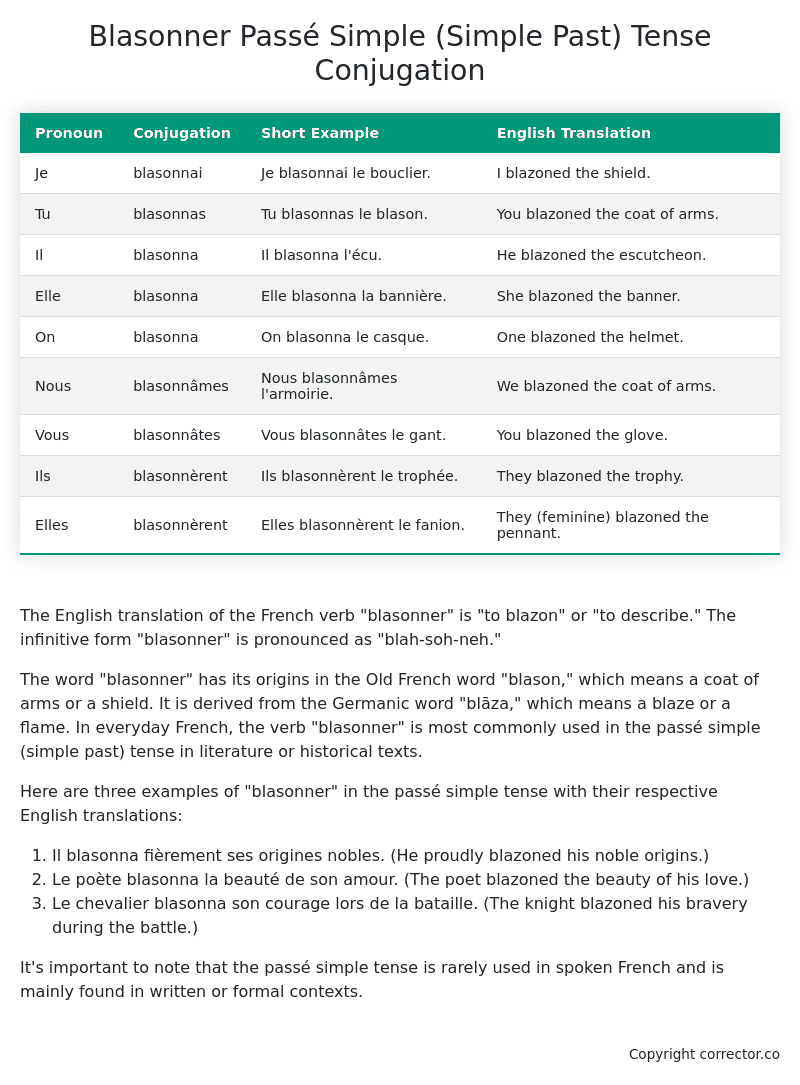Passé Simple (Simple Past) Tense Conjugation of the French Verb blasonner
Introduction to the verb blasonner
The English translation of the French verb “blasonner” is “to blazon” or “to describe.” The infinitive form “blasonner” is pronounced as “blah-soh-neh.”
The word “blasonner” has its origins in the Old French word “blason,” which means a coat of arms or a shield. It is derived from the Germanic word “blāza,” which means a blaze or a flame. In everyday French, the verb “blasonner” is most commonly used in the passé simple (simple past) tense in literature or historical texts.
Here are three examples of “blasonner” in the passé simple tense with their respective English translations:
- Il blasonna fièrement ses origines nobles.
(He proudly blazoned his noble origins.) - Le poète blasonna la beauté de son amour.
(The poet blazoned the beauty of his love.) - Le chevalier blasonna son courage lors de la bataille.
(The knight blazoned his bravery during the battle.)
It’s important to note that the passé simple tense is rarely used in spoken French and is mainly found in written or formal contexts.
Table of the Passé Simple (Simple Past) Tense Conjugation of blasonner
| Pronoun | Conjugation | Short Example | English Translation |
|---|---|---|---|
| Je | blasonnai | Je blasonnai le bouclier. | I blazoned the shield. |
| Tu | blasonnas | Tu blasonnas le blason. | You blazoned the coat of arms. |
| Il | blasonna | Il blasonna l’écu. | He blazoned the escutcheon. |
| Elle | blasonna | Elle blasonna la bannière. | She blazoned the banner. |
| On | blasonna | On blasonna le casque. | One blazoned the helmet. |
| Nous | blasonnâmes | Nous blasonnâmes l’armoirie. | We blazoned the coat of arms. |
| Vous | blasonnâtes | Vous blasonnâtes le gant. | You blazoned the glove. |
| Ils | blasonnèrent | Ils blasonnèrent le trophée. | They blazoned the trophy. |
| Elles | blasonnèrent | Elles blasonnèrent le fanion. | They (feminine) blazoned the pennant. |
Other Conjugations for Blasonner.
Le Present (Present Tense) Conjugation of the French Verb blasonner
Imparfait (Imperfect) Tense Conjugation of the French Verb blasonner
Passé Simple (Simple Past) Tense Conjugation of the French Verb blasonner (You’re reading it right now!)
Passé Composé (Present Perfect) Tense Conjugation of the French Verb blasonner
Futur Simple (Simple Future) Tense Conjugation of the French Verb blasonner
Futur Proche (Near Future) Tense Conjugation of the French Verb blasonner
Plus-que-parfait (Pluperfect) Tense Conjugation of the French Verb blasonner
Passé Antérieur (Past Anterior) Tense Conjugation of the French Verb blasonner
Futur Antérieur (Future Anterior) Tense Conjugation of the French Verb blasonner
Subjonctif Présent (Subjunctive Present) Tense Conjugation of the French Verb blasonner
Subjonctif Passé (Subjunctive Past) Tense Conjugation of the French Verb blasonner
Subjonctif Imparfait (Subjunctive Imperfect) Tense Conjugation of the French Verb blasonner
Subjonctif Plus-que-parfait (Subjunctive Pluperfect) Tense Conjugation of the French Verb blasonner
Conditionnel Présent (Conditional Present) Tense Conjugation of the French Verb blasonner
Conditionnel Passé (Conditional Past) Tense Conjugation of the French Verb blasonner
Conditionnel Passé II (Conditional Past II) Tense Conjugation of the French Verb blasonner
L’impératif Présent (Imperative Present) Tense Conjugation of the French Verb blasonner
L’impératif Passé (Imperative Past) Tense Conjugation of the French Verb blasonner
L’infinitif Présent (Infinitive Present) Tense Conjugation of the French Verb blasonner
L’infinitif Passé (Infinitive Past) Tense Conjugation of the French Verb blasonner
Le Participe Présent (Present Participle) Tense Conjugation of the French Verb blasonner
Le Participe Passé (Past Participle) Tense Conjugation of the French Verb blasonner
Struggling with French verbs or the language in general? Why not use our free French Grammar Checker – no registration required!
Get a FREE Download Study Sheet of this Conjugation 🔥
Simply right click the image below, click “save image” and get your free reference for the blasonner Passé Simple tense conjugation!

Blasonner – About the French Passé Simple (Simple Past) Tense
Formation
Usage
Narration
Historical Context
Interactions with other tenses
Passé Composé
Imparfait
Conditional and Subjunctive
Summary
I hope you enjoyed this article on the verb blasonner. Still in a learning mood? Check out another TOTALLY random French verb conjugation!


